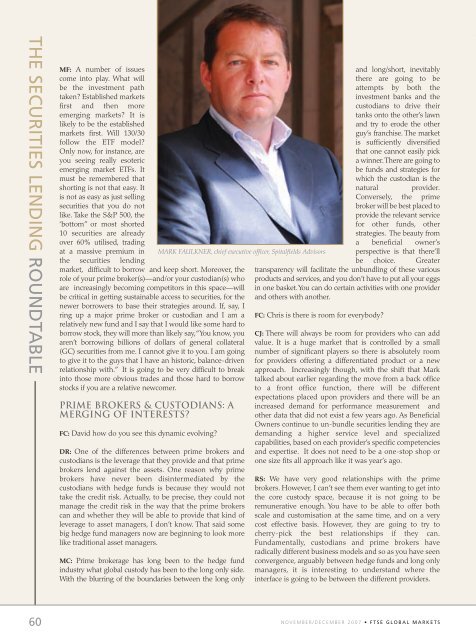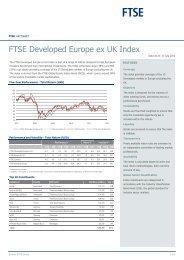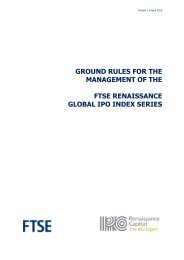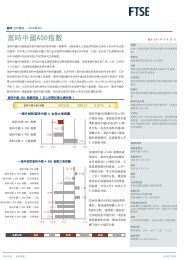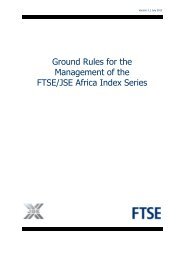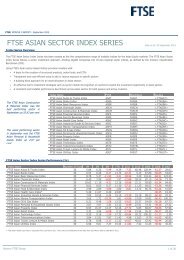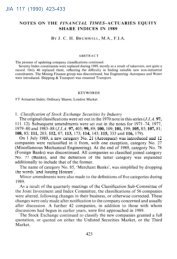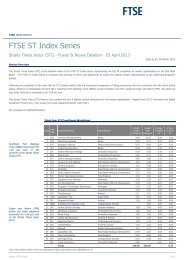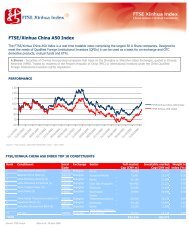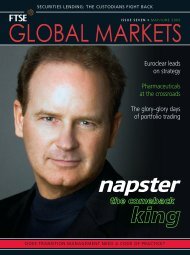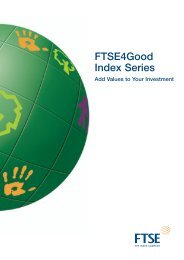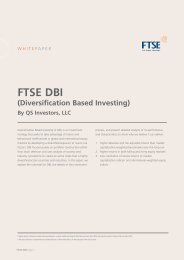Section 2 - FTSE
Section 2 - FTSE
Section 2 - FTSE
You also want an ePaper? Increase the reach of your titles
YUMPU automatically turns print PDFs into web optimized ePapers that Google loves.
THE SECURITIES LENDING ROUNDTABLE<br />
60<br />
MF: A number of issues<br />
come into play. What will<br />
be the investment path<br />
taken? Established markets<br />
first and then more<br />
emerging markets? It is<br />
likely to be the established<br />
markets first. Will 130/30<br />
follow the ETF model?<br />
Only now, for instance, are<br />
you seeing really esoteric<br />
emerging market ETFs. It<br />
must be remembered that<br />
shorting is not that easy. It<br />
is not as easy as just selling<br />
securities that you do not<br />
like. Take the S&P 500, the<br />
‘bottom” or most shorted<br />
10 securities are already<br />
over 60% utilised, trading<br />
at a massive premium in<br />
the securities lending<br />
market, difficult to borrow and keep short. Moreover, the<br />
role of your prime broker(s)—and/or your custodian(s) who<br />
are increasingly becoming competitors in this space—will<br />
be critical in getting sustainable access to securities, for the<br />
newer borrowers to base their strategies around. If, say, I<br />
ring up a major prime broker or custodian and I am a<br />
relatively new fund and I say that I would like some hard to<br />
borrow stock, they will more than likely say,“You know, you<br />
aren’t borrowing billions of dollars of general collateral<br />
(GC) securities from me. I cannot give it to you. I am going<br />
to give it to the guys that I have an historic, balance-driven<br />
relationship with.” It is going to be very difficult to break<br />
into those more obvious trades and those hard to borrow<br />
stocks if you are a relative newcomer.<br />
PRIME BROKERS & CUSTODIANS: A<br />
MERGING OF INTERESTS?<br />
FC: David how do you see this dynamic evolving?<br />
MARK FAULKNER, chief executive officer, Spitalfields Advisors<br />
DR: One of the differences between prime brokers and<br />
custodians is the leverage that they provide and that prime<br />
brokers lend against the assets. One reason why prime<br />
brokers have never been disintermediated by the<br />
custodians with hedge funds is because they would not<br />
take the credit risk. Actually, to be precise, they could not<br />
manage the credit risk in the way that the prime brokers<br />
can and whether they will be able to provide that kind of<br />
leverage to asset managers, I don’t know. That said some<br />
big hedge fund managers now are beginning to look more<br />
like traditional asset managers.<br />
MC: Prime brokerage has long been to the hedge fund<br />
industry what global custody has been to the long only side.<br />
With the blurring of the boundaries between the long only<br />
and long/short, inevitably<br />
there are going to be<br />
attempts by both the<br />
investment banks and the<br />
custodians to drive their<br />
tanks onto the other’s lawn<br />
and try to erode the other<br />
guy’s franchise. The market<br />
is sufficiently diversified<br />
that one cannot easily pick<br />
a winner.There are going to<br />
be funds and strategies for<br />
which the custodian is the<br />
natural provider.<br />
Conversely, the prime<br />
broker will be best placed to<br />
provide the relevant service<br />
for other funds, other<br />
strategies. The beauty from<br />
a beneficial owner’s<br />
perspective is that there’ll<br />
be choice. Greater<br />
transparency will facilitate the unbundling of these various<br />
products and services, and you don’t have to put all your eggs<br />
in one basket.You can do certain activities with one provider<br />
and others with another.<br />
FC: Chris is there is room for everybody?<br />
CJ: There will always be room for providers who can add<br />
value. It is a huge market that is controlled by a small<br />
number of significant players so there is absolutely room<br />
for providers offering a differentiated product or a new<br />
approach. Increasingly though, with the shift that Mark<br />
talked about earlier regarding the move from a back office<br />
to a front office function, there will be different<br />
expectations placed upon providers and there will be an<br />
increased demand for performance measurement and<br />
other data that did not exist a few years ago. As Beneficial<br />
Owners continue to un-bundle securities lending they are<br />
demanding a higher service level and specialized<br />
capabilities, based on each provider’s specific competencies<br />
and expertise. It does not need to be a one-stop shop or<br />
one size fits all approach like it was year’s ago.<br />
RS: We have very good relationships with the prime<br />
brokers. However, I can’t see them ever wanting to get into<br />
the core custody space, because it is not going to be<br />
remunerative enough. You have to be able to offer both<br />
scale and customisation at the same time, and on a very<br />
cost effective basis. However, they are going to try to<br />
cherry-pick the best relationships if they can.<br />
Fundamentally, custodians and prime brokers have<br />
radically different business models and so as you have seen<br />
convergence, arguably between hedge funds and long only<br />
managers, it is interesting to understand where the<br />
interface is going to be between the different providers.<br />
NOVEMBER/DECEMBER 2007 • <strong>FTSE</strong> GLOBAL MARKETS


